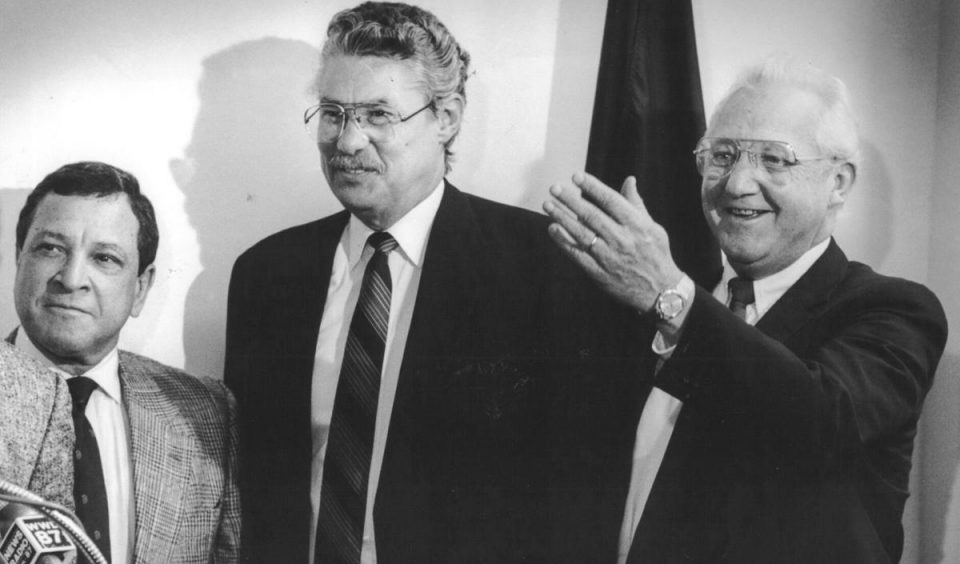A Moon Landrieu Story
by Orissa Arend, author of Showdown in Desire: The Black Panthers Take a Stand in New Orleans
I want to add a story to the long list of accomplishments of Moon Landrieu who died on September 5 at his home in Broadmoor at age 92.
Only a few months into his term as Mayor on November 19, 1970 he averted what almost everyone expected to be a race war, a blood bath, a massacre. Two hundred and fifty or so police boarded buses for the Desire Housing Project that morning armed with riot guns and wearing bullet-proof vests. They marched into the project behind an armored vehicle dubbed the “war wagon.” Three helicopters circled above while state police stood ready nearby.
The army of police were determined to serve an eviction notice on the Black Panthers who had moved into a Desire apartment after a shoot out in October with police at their residence on Piety Street. What the City officials hadn’t counted on was how determined the Desire residents were to protect the Panthers. In a brave display of leadership, the new Police Chief, Clarence Giarrusso, walked the streets of Desire himself, unarmed, spat upon, and called a pig.
The Panthers were armed and had grenades. Some of them had served in Vietnam. The FBI considered them the most dangerous group in the country. And they were not about to back down or leave. It could not have been a more tense situation.
In 2003, as I was doing research for a book, Landrieu invited me to his house. As we sat in his living room for an hour or so, he told me this: “I discussed it with the chief of police. He told me what his plan was. I authorized him to go on in. Gave him one bit of advice, which you could call an instruction, because it was more than just advice. And that was: I did not want any of those police officers in there after dark; negotiate [the Panthers] out before dark, or they were to vacate that project, because I did not want a police officer shot. The fact of the matter is I didn’t want anybody shot.”
Related: Malik Rahim Honored
The police did vacate the project later on in the day. Landrieu went on to say, “Well, it was a source of enormous disappointment and embarrassment to the police, because they were being heckled and yelled at and humiliated by some of the residents down there, particularly kids, I’m told. I wasn’t down there personally. But I was at police headquarters when the buses came back. The cops were furious – furious at me, furious at the superintendent. I suspect more furious at me for having insisted they get out of that project because they were at a stalemate.”

After the standoff, Landrieu said to his assistant, Bob Tucker, “You know what? I admire the hell out of those kids.”
“What kids?” Tucker wanted to know.
“The Panthers,” Landrieu told Tucker. “To find a seventeen – , eighteen -, nineteen – year-old who had a cause he was willing to die for. That’s something. For a young person to be so committed to something. I disagreed with what they were trying to do. But I admired that kind of commitment.”
Thirty-three years later, when we brought Landrieu, Tucker, several of the Panthers and many other actors from the standoff together for a reconciliation at Ashe Cultural Arts Center, Landrieu used almost the exact same words.
As the forum approached, Landrieu called to ask me, “Are the Panthers still revolutionary or have they mellowed?”
“Both,” I told him.
The night of the forum, Landrieu was on the hot seat, but one would never have known it from his gracious demeanor. “God bless them,” he said of the Panthers. “They drove me crazy at times. I had a grudging respect for them, though I thought, and still think, that the path they took was incorrect.”
After the forum, Landrieu told a reporter that, looking back, he believes the path the city chose also was incorrect. “I think we should not have gone into the project with such massive force. It seemed to be reasonable at the time, but in retrospect we could have found a better way to do that.”
On September 18, 2003 the Times-Picayune covered the reconciliation forum with a front page story including a photo of the original standoff and a picture of a hug between Bob Tucker and former Panther Malik Rahim.
Moon Landrieu led us through a crisis. Other cities were going up in flames and people were killing each other in Panther/police confrontations. In this showdown, we avoided that. Landrieu considered all of the angles He could understand opposing views, even when he disagreed. He reflected and learned from the experience over decades. And finally, he was able to participate in what seemed to me like a miraculous reconciliation. They just don’t make leaders like Moon Landrieu anymore.
